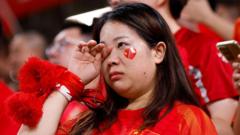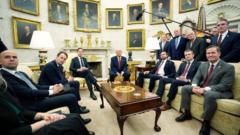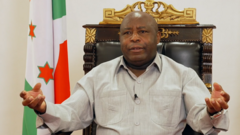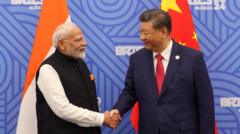As tensions rise in eastern Democratic Republic of Congo (DRC) due to the influence of Rwandan-backed M23 rebels, China finds itself in a complex position. Historically, the country adopted a stance of neutrality in African conflicts to safeguard its expansive business ventures. However, recent developments challenge this approach, particularly in light of accusations against Rwanda for fueling unrest in mineral-rich regions.
**China's Diplomatic Dilemma Deepens Amid DR Congo Conflict**
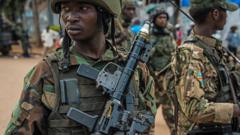
**China's Diplomatic Dilemma Deepens Amid DR Congo Conflict**
China treads cautiously in the escalating conflict between DR Congo and Rwandan-backed rebels, balancing business interests and diplomatic relations.
Recent months have seen escalating military actions from the M23 rebels, with major cities such as Goma and Bukavu falling under their control, raising alarms for foreign stakeholders including China. Beijing has long enjoyed close ties with both the DRC and Rwanda, but the current crisis has forced a reevaluation of its usual diplomatic lenience. Notably, China recently shifted from its tradition of ambiguity regarding African conflicts, directly addressing Rwanda's role in supporting the rebellion.
While historically refraining from naming specific countries involved in regional conflicts, China's criticism of Rwanda marks a significant shift in its diplomatic landscape. China's UN ambassador called for Rwanda to cease military support for the M23, signaling a departure from its typically non-confrontational rhetoric. Observers note that this change may stem from substantial evidence presented in UN expert reports, which underline the Rwandan government’s involvement with the rebel group.
Despite this new stance, experts assert that the language used by China remains careful, as expressed by Professor Zhou Yuyuan, indicating that while calling for changes, China still refrains from outright condemnation. This measured tone reflects Beijing's broader interests in maintaining stable relations in a region highly valued for its natural resources vital to Chinese industry.
The conflict's impact on vital mining operations in DRC, particularly for minerals like coltan and cobalt, further complicates China’s diplomatic maneuvering. Experts indicate that coltan smuggling narratives and Rwanda’s increasing exports of the mineral could trigger critical supply chain concerns for China, which relies heavily on Africa for these resources.
China's approach also encompasses military ties, as evidenced by its sales of equipment to both the Congolese and Rwandan forces, although the extent of such assistance during the current turmoil remains unclear. The intricate web of China’s diplomatic and economic relationships is woven into the very fabric of the DRC and Rwanda's geopolitical landscape, underscoring the importance of stability for future investments.
As this situation continues to evolve, the future of China’s business operations in the DRC, part of its ambitious Belt and Road Initiative, could hinge on the resolution of the conflict, forcing Beijing to navigate a diplomatic pathway that could determine the efficacy of its long-term interests in Africa.










